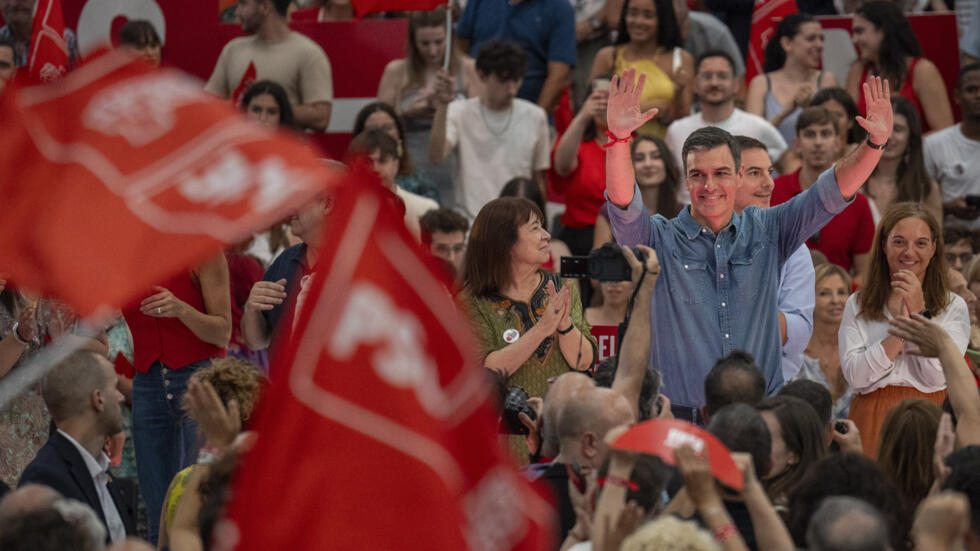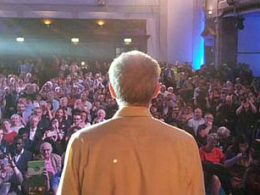By John Hird
Around the world, the socialist movement will be asking, given the social conditions in the Spanish state, with 2.8 million in absolute poverty, sky-rocketing energy and food prices and many workers and communities in struggle, not to mention the fighting traditions of the working class, how is it the the right-wing Popular Party with the support of the ultra-right VOX are within touching distance of power?
Marxists aspire to offer a sober analysis of what is happening. Not just a snapshot of an election but a moving picture of events and processes, which attempts to explain how we got to where we are today and what are the consequences of the results?
Previously we reported after the victory of the right in the recent local and regional elections that the failure of the left to carry through their programmes in various city halls and autonomous governments’ and the lack of unity around a clear fighting left programme is debilitating. Millions of workers and youth in the Spanish state fear and oppose the rise of the right and a possible PP -VOX government after July 23rd but are not inspired by the left alternative on offer.
During the general election campaign Sánchez used the fear of VOX entering the government as his main weapon and it had a certain effect in the last few days of the campaign as voters contemplated the possibility of a far-right party in power. VOX lost 19 seats while PP gained 47.
Close results
The results were very close.The PP got 33.1% of the total vote to 31.7% for PSOE, a difference of only 330,953 votes. VOX were the third party with 3,033,678 votes (12.4%) and the new left coalition SUMAR were fourth with 3,013,899 (12.3%)
Participation in the elections increased by 4.2% to 70.39%, compared to 2019. Since the first elections in Spanish democracy in 1977, the average participation in general elections has been 72.28%, reaching as high as 82% at crucial moments as in 1982.
In working class neighborhoods, people have seen with their own eyes the failure of PSOE-UP coalition to support them. PSOE’s inability to inspire the voters, coupled to the fear of VOX in government are the main factors in the electoral deadlock.
90% of the promises in the PSOE-UP election programme on which they ran in 2019 have not been kept.
Workers struggling
Many sections of the working class have been involved in big and serious struggles yet they were not supported by the ‘left’ government.
In 2021 in Cadiz a bitter metal workers’ strike broke out and the coalition government sanctioned the use of mini-tanks in the city to attack the strikers in their neighbourhoods. Workers in health, education and transport have all been on strike, yet the coalition did not stick to their commitment to reform the restrictive Labour Laws.
The ‘Gagging Law’ which is used to jail young rappers and shut up anyone who criticises royalty, politicians and the rich and powerful is still on the statute books.
Cuts to education and health have not been reversed and the housing crisis continues apace with families thrown on the street due to poverty and no social housing being built.
Progressive laws in favour of women and the LGBTQI+ community have been partially sabotaged and racist laws remain in place and the Guardia Civil murderous attacks on refugees and immigrants in Melilla. Sánchez even said at the time, ‘job well done’.
Role of the left
A new ‘left’ coalition has also failed to inspire young people and the working class. SUMAR is led by Yolanda Díaz, the minister for Work and the Economy.
Díaz formed SUMAR as a vehicle to continue the parliamentary careers of Podemos and IU deputies, who, when in coalition with PSOE, suffered a massive drop in support due to not implementing their 2019 promises.
Alternativa Socialista (ISA in the Spanish State) opposed Podemos and IU entering into a coalition at the time. We urged that they instead support the formation of minority PSOE administration, to have the freedom to criticise the government from the left.
Unfortunately, being part of the coalition has almost wrecked the Podemos project. Pablo Iglesias has retired from politics and the working class is skeptical about the commitment to real change of the ‘parliamentary comrades’.
In the newspaper columns and podcasts of media which support the parliamentary ‘left’ there is a certain condescension towards the young and working class voters who are taking an abstentionist position.
There is no attempt by the official ‘left’ to analyse why there is so little enthusiasm for the coalition. They quote government statistics and claim they are the most ‘progressive’ government in living memory.
What is the reality?.
The regional and local elections when left figures such as Ada Colau, who was mayor of Barcelona lost power, marked a turning point and revealed that the mass of working class people do not agree that the coalition has been ‘progressive’ or have made a real difference in their lives.
Colau and other left movements around Podemos were raised to power by powerful movements from the streets, such as ‘Los Indignados’ and in the case of Colau a housing movement.
When in power, little by little they abandoned their radical programmes and became institutionalised. This is an important point to grasp to understand the difficulty the left have had in stopping the right in the general election.
Fear of the ultra-right
However, it does not represent a fundamental shift to the right amongst the working class and youth in the Spanish state.
The extra votes PSOE — SUMAR have received in the last few days of campaigning is due to fear of seeing the ultra right in power but not an endorsement of the coalition’s record.
Yolanda Díaz is a member of the PCE (Spanish CP) and staying true to her traditions, purged the remaining militant and left-wing Podemos deputies from the electoral lists, including the minister for Equality and Podemos leader, Irene Montero.
Montero is seen as a fighter for women’s rights and the LGBTQI+ community. She suffered horrendous and disgusting attacks from the right and press for her stance in support of trans rights.
Her exclusion from the election lists has further demoralised the best left activists.
The campaign of Sánchez and Díaz depended on soft focus ads, using statistics to claim the economy is on the up, inflation is under control and record numbers of people are in employment.
The statistics do not correspond with the lived reality in working class districts where the working poor live on salaries way below the average.
The election results confirm that the Spanish State remains extremely polarised. The advance of the PP in the elections does not mean they are winning hearts and minds. Their lead is due to a shift of votes on the right.
The centre right Ciudadanos (Citizen’s party) collapsed and has almost disappeared.
It was set up by the ruling class to confuse and capture voters who were moving left in the previous period. The PP may have got around 900,000 votes from that party and about 700,000 VOX voters transferred their vote to the PP due to the idea of the ‘useful’ vote, that is a vote for a party which can form a government. A point that the PP have campaigned hard on.
Following the local and regional elections Vox entered the government of various towns and provinces. In the village of Náquera in Valencia they have banned demonstrations in support of and in memory of women killed by men.
VOX also convinced the PP to ban the use of the term, ‘violencia de genero’ (Gender violence), instead they use the term, ‘inter family violence’ — This is an attempt to deny the existence of violence against women.
They also propose to ban the flying of LGBTQI+ flags from municipal buildings.
They have already said they want the Education portfolio and in power will try to ban lessons on Women’s and LGBTQI+ equality in Spanish schools.
They have also stated they want to limit regional autonomy in the Basque Country and Catalonia and restrict the teaching of the various minority languages in the Spanish State.
During the election campaign the far right party demanded to form part of the government in Madrid. This possible nightmare reality explains why many workers voted for PSOE and SUMAR with fingers on their noses. This process meant PSOE were the main party in the Basque Country and Cataluyna. In Catalunya, although the independence parties will be decisive as regards the possibility of Sánchez forming a government, their overall vote decreased.
National question
The historically unresolved national questions ebb and flow in the Spanish state.
A right wing victory, especially with the participation of VOX would have exacerbated the underlying national tensions. Already, in 2020, VOX proposed a law which would illegalise Catalan and Basque independence parties. In the recent local elections in the Basque capital, Vitoria-Gasteiz, the left-Basque nationalist party, EHBildu won a majority for the first time. In 2015 Podemos won the highest percentage of votes in elections in the Basque Country with 26.02%. Since then, the experience of Podemos in power has caused a shift towards EHBildu, especially amongst the youth.
Fear of VOX entering into a coalition with PP and insisting on pursuing their provocative policies, hardened opposition to the PP and VOX in the Basque Country where support for pro — independence left party EHBildu increased.
In the Basque Country, PSOE won most votes and seats in the Spanish parliament, closely followed by left-nationalist party EHBildu who replaced the bourgeois Basque nationalist party, PNV as the main independence force.
In Catalonia, PSOE topped the poll with 34.5% of the vote, followed by SUMAR with 14%. The PP were in 5th place behind Catalan independence parties, ERC and Junts. VOX only managed to get two seats.
Who forms government?
The electoral arithmetic means neither PP or PSOE can form a government on their own and Sánchez has achieved his aim of preventing VOX forming a coalition with the PP as the right-wing parties do not have sufficient seats.
Feijóo will attempt to form a government but will find it extremely difficult to reach the 176 needed to form a majority. Falling short in the elections has provoked another crisis in the PP. When Feijóo spoke on the balcony of the PP’s headquarters in Génova on Sunday night, his speech was interrupted with shouts of, ‘¡Ayuso, Ayuso!’ Isabel Ayuso is the populist President of the Madrid region who played the decisive role in forcing the last leader of the PP, Pablo Casado to resign over the issue of collaboration with Vox.
It is possible that Sánchez will be able to cobble together a coalition involving SUMAR directly with the support of various independence parties in Catalonia and the Basque Country. In the past PNV have supported PP governments but with EHBildu to their left that seems unlikely today, plus it would mean endorsing a coalition with VOX, a party which has publicly declared they would try to ban independence parties if they gained power.
During the election campaign the PP cynically conjured up the ghost of ETA which had little effect in the Basque Country. However, the Spanish press are reporting that a living ghost could be back to haunt the main parties. Carles Puigdemont, the ex-President of Catalonia who made the short lived declaration of independence in 2017 could hold the key to a possible PSOE government as Sánchez would need the votes of his party Junts to form a government.
The inability of any of the main traditional parties to obtain a majority on their own, is a sign of the crisis of right and social democratic parties.
The new left formations have also failed. The 1978 Spanish constitution and electoral system are rigged to prevent real and fundamental change. From the ‘movida madrileña’ in the 1980s, through the movement of ‘Los Indignados’ and the magnificent feminist movement in the last few years, cultural change and rights for women and the LGBTQI+ community have been fought for and won on the streets by mass movements and later endorsed by the politicians.
The idea that the participation of VOX in government would mean they would be able to turn back the clock to the times of Franco is ludicrous. However, it would introduce a further distabling element into the political situation. For that reason, the more farsighted Spanish bourgeois would prefer to govern without VOX although the electoral arithmetic could oblige them to do so in the future.
For now there will be months of political horse trading which could result in a PSOE coalition or new elections, which means the possibility of a PP government including VOX is not off the agenda.
The situation is crying out for a party based on the working class and youth with a clear left programme. Such a party will not come out of the parliamentary manouveurs we will see in the coming months in the Spanish state.
Let’s not forget, Podemos were raised to power on the backs of a semi spontaneous mass movement. ‘Los indignados’ and ’15 de mayo’. Some of the local and regional left formations and coalitions which included Podemos had been in power since 2016.
Of course a possible victory for the right in the future will be a setback, but not a fundamental defeat for the working class. There will be initial shock, but eventually they will provoke a whirlwind of opposition if they try to carry out their threats
Neither will a parliamentary victory for the right stop similar movements on the level of, if not higher than ‘Los Indignados’ and the feminist movement in the future and socialists need to be prepared for that.












